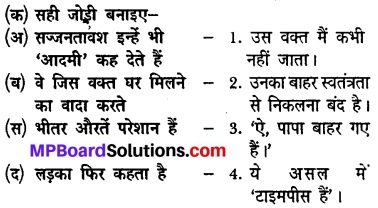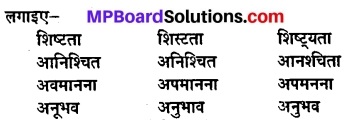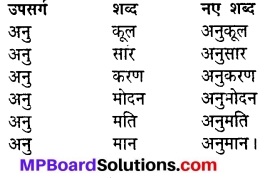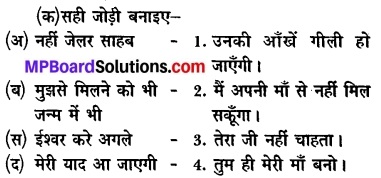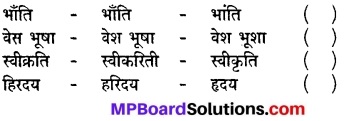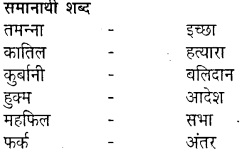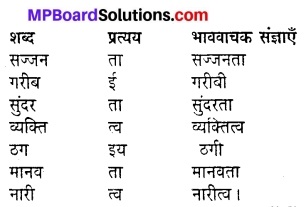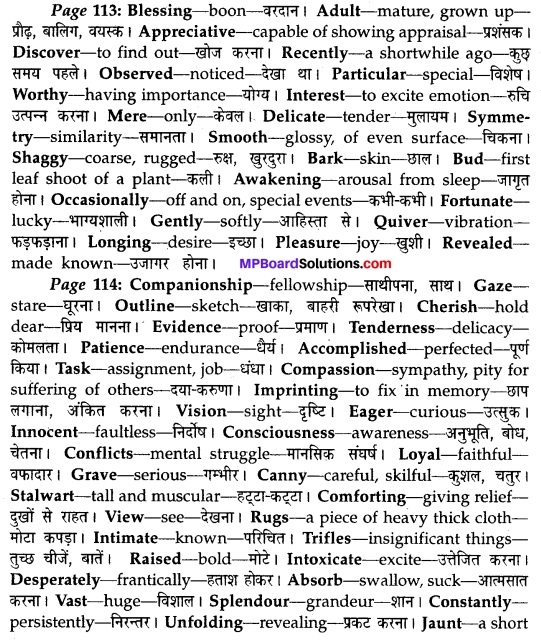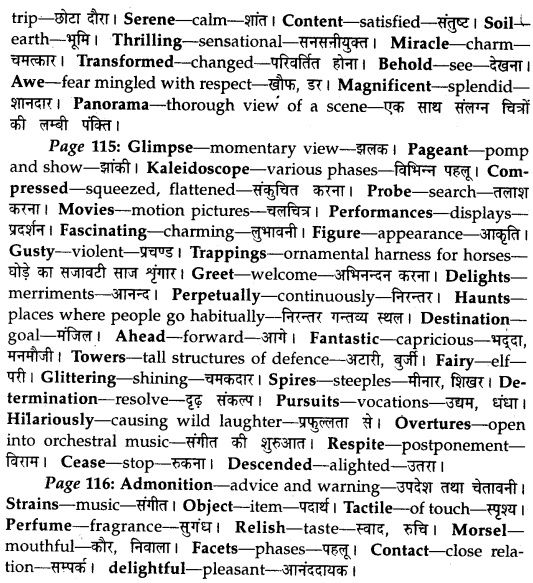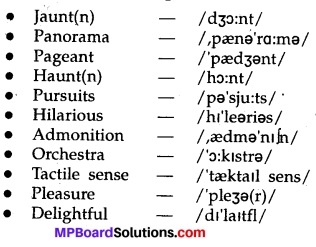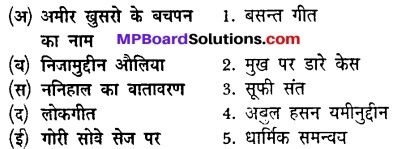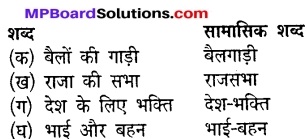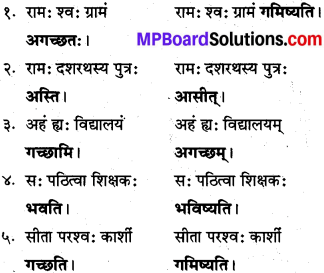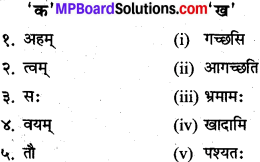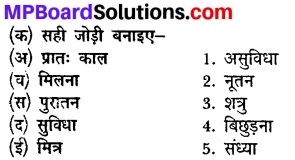Are you seeking for the Madhya Pradesh Board Solutions 10th English Chapter 4 To the Cuckoo Questions and Answers PDF? If yes, then read this entire page. Here, we are giving a direct link to download MP Board Class 10th English Solutions Questions and Answers PDF which contains the chapter wise questions, solutions, and grammar topics. You can also get the shortcuts to solve the grammar related questions on this page.
MP Board Class 10th English The Rainbow Solutions Chapter 4 To the Cuckoo (William Wordsworth)
For the sake of students we have gathered the complete 10th English Chapter 4 To the Cuckoo Questions and Answers can provided in pdf Pattern. Refer the chapter wise MP Board Class 10th English Solutions Questions and Answers Topics and start the preparation. You can estimate the importance of each chapter, find important English grammar concepts which are having more weightage. Concentrate on the important grammar topics from Madhya Pradesh Board Solutions for 10th English Chapter 4 To the Cuckoo Questions and Answers PDF, prepare well for the exam.
To the Cuckoo Textbook Exercises
To the Cuckoo Vocabulary
I. Note down the exact meaning of the following words:
wander, stride, stamp, creep, lotter, limp, stroll, rove.
Answer:
Word : Meaning
Wander: To walk slowly around without any direction or purpose.
Stride : To walk with long steps. Stamp : To crash by putting down the foot with force.
Creep : To crawl, sweeping the ground with the belly.
Loiter : To linger about in a public place usually with no obvious reason. To go with a lame gait.
Limp: To walk lamely Stroll To ramble (saunter from place to place).
Rove : To travel from one place to another, often with no definite purpose.
II. Match the words given under A with the meanings given under B.


Answer:
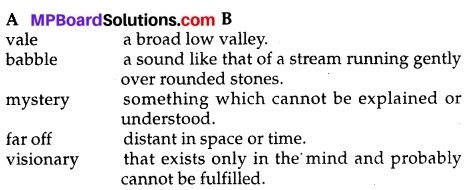
III. Use the following words in your own sentences.
wood, woods, sweet, sweets, blind, blinds issue, issues, spring, springs.
Answer:
Word : Usage
Wood : Our doors are made of wood.
Woods : Beasts live in the woods.
Sweet : She has a very sweet nature.
Sweets : A patient of diabetes should avoid eating sweets.
Blind : The old man has gone blind.
Blinds : Draw/lower the blinds on the curtain.
Issue : The Principal issued me the character certificate.
Issues : Alas! the old man has no issues.
Spring : Spring is the king of seasons.
Springs : Springs gush out of the mountains.
iv . Say the following words correctly,
though, thou, thee
Answer:

To the Cuckoo Comprehension
A. Answer the following questions in about 25 words.
To The Cuckoo Poem Questions And Answers MP Board Question 1.
How does the poet address the cuckoo in the beginning of the poem and why does he do so?
Answer:
The poet, William Wordsworth, addresses the cuckoo as the Blithe Newcomer’ in the beginning of the poem. He calls it a newcomer because its song captivates and moves him to supreme spiritual joy.
Mp Board Class 10 English Chapter 4 Question 2.
Why does the poet choose to call the cuckoo a wandering voice?
Answer:
The poet is lying on the grass. He hears the cuckoo’s two fold shout. Sometimes it goes far off. At other times, it comes too near. He calls the cuckoo a wandering voice because it wanders from hill to hill.
Class 10 English Chapter 4 Mp Board Question 3.
What does the cuckoo bring to the poet?
Answer:
The cuckoo sings in the sunny and flowery valley. It moves the poet to supreme spiritual joy. It transports him to a land of bliss. It revives the memory of a visionary tale in him.
To The Cuckoo Poem Questions And Answers Mp Board Question 4.
What did the cuckoo make the poet do during his school days?
Answer:
The poet used to listen to the cuckoo’s song during his school days. The cuckoo’s cry enchanted his heart. It urged him to see the invisible bird. Therefore, he wandered through woods and plains to seek her.
To The Cuckoo Poem Questions And Answers Pdf MP Board Question 5.
How does the earth appear to the poet after hearing the cuckoo’s voice?
Answer:
The earth appears substantial and physical to the poet. His attitude towards earth has changed after hearing the cuckoo’s voice. Now the earth appears unreal like the fairyland. (It shows that Wordsworth’s attitude to nature was ever-changing).
B. Answer the following questions in about 50 words.
To The Cuckoo Poem Summary In Hindi MP Board Question 1.
What does the poet seek to convey in the following stanza:
Thrice welcome, darling of the Spring!
Even yet thou art to me.
No bird but an invisible thing,
A voice, a mystery.
Answer:
The poet calls the cuckoo as the darling of spring. Its song is sweeter than the song of other birds. Even the spring season is proud of her. The poet welcomes her again and again. He considers the cuckoo like an invisible thing (fairy) whose voice is a mystery. He treats the cuckoo as a divine bird and not an earthly bird.
To The Cuckoo Poem In Hindi MP Board Question 2.
Describe the various ways in which the poet addresses the cuckoo in the poem.
Answer:
The poet addresses the cuckoo in various ways. In the first stanza he calls it as a ‘Blithe Newcomer’ and ‘a wandering voice.” Then he calls it as ‘Darling of the Spring’, ‘an invisible thing’, ‘a voice’, ‘a mystery.’ Last of all he calls it ‘a blessed bird’.
Speaking Skill
A. Speak aloud the following rhyming words
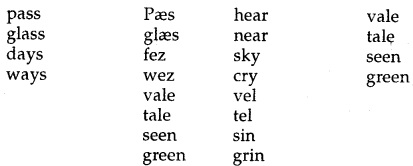
Answer:

B. You must have learnt a lot about the various habits and behaviour patterns of different kinds of birds.
Tell your classmates about your favourite bird and its appearance.
Answer:
Some birds sing more than necessary. Many birds like gulls live in flocks. Some birds do not sing in the usual manner but make loud noises which serves the purpose of a song. A male grey heron gives a loud cry every half minute so long as it is unmatched. The woodpecker drums to attract the females.
My favourite bird is a male nightingale. While it sings it looks continuously round in all directions. It usually sings every morning from the same place. It stops singing when a female arrives. It becomes silent after it has mated. The nightingale is larger than the cuckoo.
Writing Skill
Mp Board Class 10 English Workbook Solutions Chapter 4 Question 1.
‘Nature is a great teacher,’ Elaborate the thought. (50 words)
Answer:
Wordsworth felt that nature leads one from joy to joy. He believed that nature was a living being. For him, nature was a supreme spirit. Its sole purpose was to delight and teach human beings. There is a mystic bond between nature and man. Nature reflects his own mood. He also saw hearing power in nature. Nature to Wordsworth was everything. Nature is ready to guide anyone who would care to be guided by her. Nature can teach about morals, evil and of good more than the sages. Nature never betrays the heart that loves it.
Chapter 4 English Class 10 Mp Board Question 2.
‘God’s grandeur is reflected in the beauty of nature,’ Expand the idea. (150 words)
Answer:
Nature is the creation of.’God. Nature in all phases is beautiful. The barren deserts, the icy and windy hills are beauties of nature. The sight of springing leaves and flowers and other plants in the spring season are charming sights. We can enjoy the beauty of daffodils in April. The songs of,the flowers and old songs of the sea are equally enchanting. The sunrise and sunset, the warmth of spring season and the waving flowers gladden one’s heart. The arched white sails of the ship, the songs of the blossom and the rhythmic sweet tone of the sea are all enchanting. Nature is at its youth in spring season. Winter ends and trees are laden with beautiful flowers and fruits. The sight of hills, mountains, valleys, chasms, rivers, streams, springs and ravines are soothing to eyes. It seems that God’s grandeur is reflected in the beauty of nature.
Think It Over
To The Cuckoo Summary In Hindi MP Board Question 1.
Seeing beautiful things brings happiness. Thinking of them brings equal happiness. Does it mean happiness lies with in? Ponder and pen your thought.
Answer:
The tourists go from place to place in search of beautiful things. They are happy when they see beautiful things with their own eyes. They enjoy their beauty and feel happiness. The sight of new things in the lap of nature fills one’s heart with over flowing joy. Sometimes we do not virtually see the beautiful things but think of them. That too brings us equal happiness. The thought of going on a tour, seeing nature’s beauty, attending a marriage party or meeting some close relative fills our heart with immense pleasure. It shows that happiness is within one’s heart. A grieved heart does not find any happiness even in the garden of Eden.
Mp Board Class 10 English Book Solution Chapter 4 Question 2.
Happiness in heart, peace in mind, a healthy body, nature in the eyes and a song on the lips. What else is the life? Think and give your thought the wings of words.
Answer:
Happiness in heart, peace in mind, a healthy body, nature in the eyes and a song on the lips cover a major portion of life. They form the better part of life. Life would be perfect if we have a trusted friend, a full purse and freedom of movement also. There should be somebody with us to share our happiness and woes.
Things To Do
Go to the library and find poems written on birds, such as: the skylark, the eagle, the peacock, the nightingale etc. Keep a collection of such poems in your project book.
Answer:
For self-attempt.
To the Cuckoo Additional Important Questions
A. Read the stanzas and answer questions that follow:
1. O Blithe newcomer ! I have heard,
I hear thee and rejoice:
O Cuckoo! shall call thee Bird,
or but a wandering Voice? (Page 23)
Questions:
(i) Name the poem and the poet.
(ii) Whom does the poet hear? How does he feel?
(iii) What does the poet mean by the expression “wandering voice”?
Answers:
(i) ‘To the Cuckoo’; William Wordsworth.
(ii) The poet hears the Cuckoo. He simply rejoices.
(iii) The “wandering voice” signifies that the Cuckoo wanders from one place to another and so does his cheerful and lively voice.
2. While l am lying on the grass
The two fold shout I hear;
From hill to hill it seems to pass
At once far off and near. (Page 23) (M.P. Board 2016)
Questions:
(a) The poet of these lines is:
(i) William Cowper
(ii) William Wordsworth
(iii) Robert Allen Dromgoole
Answers:
(ii) William Wordsworth
(b) The one word used for ‘sounding at high pitch’ in the above stanza is.
(i) shout
(ii) whisper
(iii) sing
(iv) weep
Answers:
(i) shout
(c) What seems to pass from hill to hill?
(i) The cuckoo’s twofold shout seems to pass from till to hill.
(ii) The nightingale’s sweet voice.
(iii) The shouting of the children.
Answers:
(c) The cuckoo’s twofold shout seems to pass from hill to hill.
3. Of visionary hours.
Thrice welcome, darling of the Spring!
Even yet thou art to me
No bird, but an invisible thing.
A voice, a mystery; (Page 24)
Questions:
(a) The above lines occur in the poem
(i) Good Will
(ii) To the Cuckoo
(iii) If
(iv) All the Words is a Stage
Answers:
(i) To the Cuckoo
(b) The one word used for ‘loved one’ in the above stanza is
(i) visionary
(ii) darling
(iii) spring
(iv) invisible
Answers:
(ii) Darling
(c) Who is referred to as ‘darling of the spring’?
(i) The little girl
(ii) The nightingale
(iii) The Cuckoo
(iv) The sparrow
Answers:
(iii) The Cuckoo
I. Match the following:
1. Cuckoo – (a) shout
2. Twofold – (b) darling of the spring
3. Vale – (c) voice
4. Invisible – (d) wandering voice
5. Thrice welcome – (e) of sunshine and of flowers.
Answer:
1. (d), 2. (a), 3. (e), 4. (c), 5. (b).
II. Pick up the correct choice:
A. I hear thee and ……………… (merry/rejoice)
B. Shall I call thee bird or a ………….. (strolling/wandering)
C. While I am lying on the (sand/grass), the two fold (shout/voice) I hear.
D. Though (bubbling/babbling) only to the Vale.
Answer:
A. rejoice
B. wandering
C. grass; shout
D. babbling.
III. Write ‘True’ or ‘False’.
1. The poet hears threefold shout of the Cuckoo.
2. The Cuckoos shout seems to pass from hill to hill.
3. The Cuckoo babbles only to the vale of sunshine and flowers.
4. The poet calls the cuckoo the bringer of the spring.
5. The poet often roved through woods and on the green to seek the Cuckoo.
Answer:
1. False, 2. True, 3. True, 4. False, 5. True.
IV. Fill in the following blanks:
1. I ________ thee and rejoice.
2. From ________ the cuckoos shout passes.
3. Thou bringest unto me a tale of ___ hours.
4. To seek thee did I often …
5. And thou were still a ., a love.
Answer:
- hear
- hill to hill
- visionary
- rove
- hope.
V. Fill in the following blanks:
1. …………… (Twice/Thrice) welcome, darling of the Spring!
2. The same in my …………… (childhood/schoolboy) days.
3. And I can listen to ………….. (you/thee) yet.
4. And listen, till I do ……………… (get/beget) that golden time again.
Answer:
- Thrice
- school boy
- thee
- beget.
B. Short Answer Type Questions (In about 25 words)
Question 1.
Give a brief sketch of William Wordsworth.
Answer:
William Wordsworth was a great admirer and a sincere lover of nature. He treated nature as his guide, guardian and soul of his moral being. He was a devoted worshipper of nature. He composed many of his poems on natural objects.
Question 2.
When and where did the poet see the Cuckoo?
Answer:
It was the spring season. The poet, Wordsworth, was lying on the grass in a valley, full of flowers. The valley was surrounded by hills. It was an enjoyable season both for the poet and the Cuckoo. The poet saw the Cuckoo flying from hill to hill.
Question 3.
Why did Wordsworth rove through the woods and on the green during his schoolboy days?
Answer:
Wordsworth was a lover and worshipper of nature ever since his school days. He used to listen to the Cuckoo’s voice. He found it quite charming. Then he looked around in bushes, trees and sky. As he could not find the Cuckoo anywhere he tried to seek it through woods and on the green.
Question 4.
How does the poet feel indebted to the Cuckoo?
Answer:
The poet calls the Cuckoo a God’s gifted creature. She spreads gladness all around the poet. She brings harmony to nature. She is like an enigma that cannot be explained. The poet feels indebted to the cuckoo for filling his heart and the environment with joy and happiness. She soothes his soul and calms his nerves. Her song sends a wave of contentment to him. He wonders whether the voice is of a bird or a human.
C. Long Answer Type Questions (In about 50 words)
Question 1.
Describe Wordsworth as the poet of nature.
Answer:
Wordsworth was a great priest of nature. Nature to him was everything. His political frustration increased his interest in nature. His passion mingled itself with the landscape. Wordsworth’s attitude towards nature continued changing throughout his life. It started with animal and sensuous pleasures and ended on a mystic night. God and nature became one for him. He accepted nature as his spiritual guide and teacher. It led him from sheer joy to joy. Nature for him was like a nurse who healed his wounds.
Question 2.
Compare Wordsworth with Coleridge.
Answer:
Coleridge’s attitude to nature in his early phase of poetic career was similar to Wordsworth’s. Both of them felt disillusioned with the consequences of the French Revolution. Both sought solace in nature. Both felt nature to be a guiding spirit and teacher. Once Coleridge made his weeping infant smile by treating him to the beauty of the moon. In the beginning Coleridge believed along with Wordsworth that ’Nature never betrays the heart that loves her. It leads one from shees joy to joy.’
Question 3.
Contrast Coleridge with Wordsworth.
Answer:
With the passage of time Coleridge realised that joy cames from within, not from external nature. He also failed to find the same healing power in nature as Wordsworth did. He also called nature as something essentially external, which only mirrors a man’s mood, be it of joy or sorrow’. He called passion and life as internal, having nothing to do with nature or anything external. But for Wordsworth nature was everything. It gave him real pleasure.
To the Cuckoo Introduction
The poet welcomes the cuckoo as a ‘Blithe Newcomer’. The bird’s song gives him immense joy. It moves him to supreme spiritual joy.
To the Cuckoo Summary in English
William Wordsworth welcomes the cuckoo as a ‘Blithe Newcomer’. Its song captivates him. The cuckoo wanders from hill to hill. Sometimes the poet hears its voice as if it is very close to him. At other times it, goes far. The poet calls her ‘darling of the spring’ and ‘a mysterious voice’.As a school boy, the poet heard the cuckoo’s voice. He loved the voice but never saw the cuckoo. He longs for the return of the old golden times. He calls the bird ‘blessed’. She has turned the ‘unreal’ earth into a fairy place.
To the Cuckoo Summary in Hindi
विलियम वर्ड्सवर्थ कोयल का ‘प्रसन्न नवागन्तुक’ के रूप में स्वागत करता है। उसका गीत उसे मन्त्रमुग्ध कर देता है। कोयल पहाड़ियों के ऊपर उड़ती रहती है। कई बार उसकी आवाज नजदीक से आती लगती है, दूसरे समय वह दूर चली जाती है। कवि उसे ‘वसन्त की प्रेमिका’ और ‘रहस्यमयी आवाज’ कहकर पुकारता है। स्कूली छात्र के रूप में कवि ने कोयल की आवाज सुनी थी। उसे उसकी आवाज से अनुराग हो गया, परन्तु उसने कोयल कभी नहीं देखी। वह इच्छा करता है कि वह पुराना स्वर्णिम समय लौट आए। वह पक्षी को ‘धन्य’ कहता है। उसने ‘असार’ पृथ्वी को परियों का काल्पनिक स्थान बना दिया है।
To the Cuckoo Word-Meanings


Some Important Pronunciations
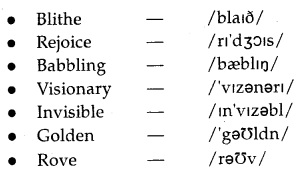
Hope that the above shaped information regarding the Madhya Pradesh Board Solutions for 10th English Chapter 4 To the Cuckoo Questions and Answers is useful for making your preparation effective. View our website regularly to get other subjects solutions.
